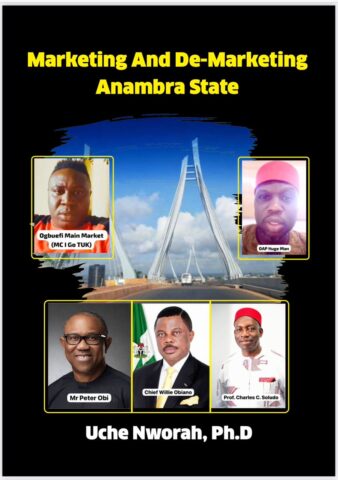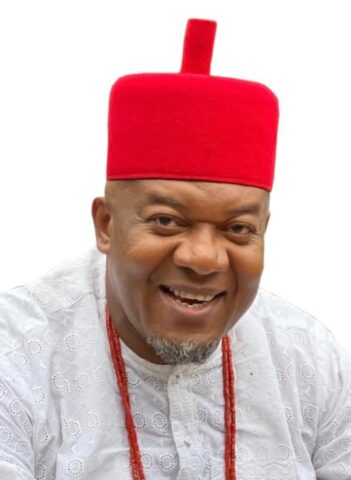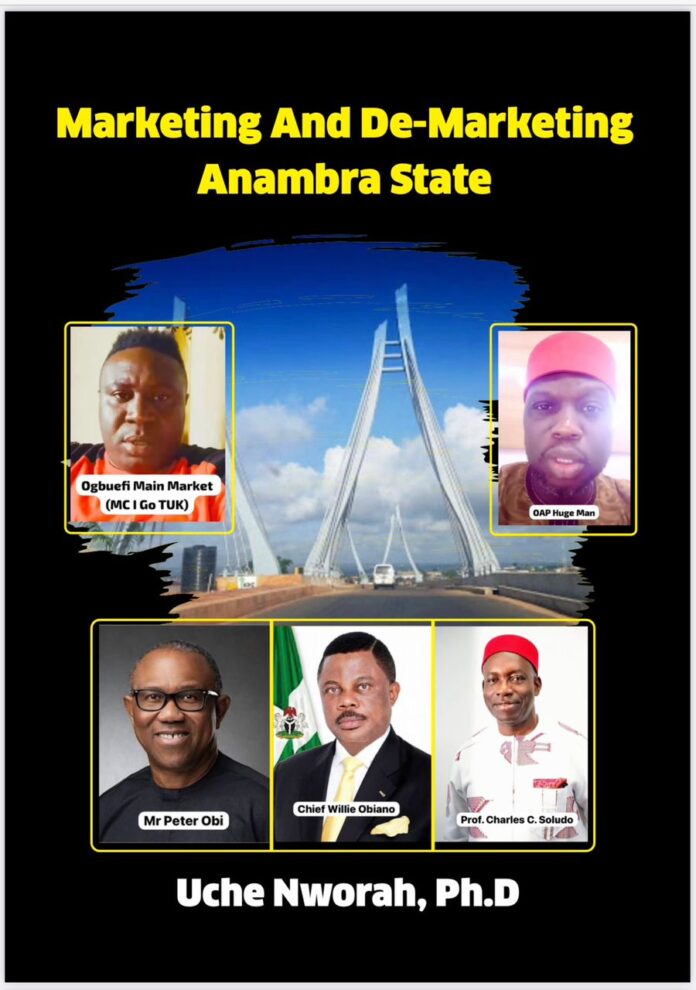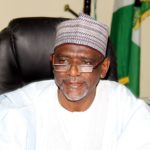Advertisement
By Uche Nworah, Ph.D
Two popular individuals within the Anambra and wider social media communities in Nigeria, – MC I Go TUK, also known as Ogbuefi Main Market and On-Air-Personality (OAP), Huge Man (Ifeanyi Orakwue) of Onitsha -based Sapentia Radio put out viral videos recently criticizing Anambra state Governor, Professor Charles Soludo. They are of the view that the Governor’s recent interactive session with Ndi Anambra living in Lagos on home-bound investment drive was an exercise in futility. They point at some of the challenges Anambra state is facing at the moment, ranging from insecurity, poor road networks in and around markets in Nnewi, Awka and Onitsha. They emphatically advised Ndi Anambra not to bother coming back home to invest until the government has tackled these challenges.
These outbursts that have since gone viral suggest that the honeymoon period that new governments enjoy has finally come to an end for Governor Soludo and his team. As we draw nearer to the 2025 Anambra state gubernatorial elections, it is normal to anticipate that many of such harsh criticisms will come. Soludo government’s honeymoon period lasted over a year. That’s a record I should say. During our time in the Obiano government when I served as the Managing Director and CEO of Anambra Broadcasting Service (ABS), we never enjoyed such long honeymoon period. The largest political propaganda known to man in these parts was unleashed on the government and its officials almost at the onset. This was occasioned by the almost immediate fall-out between Governor Obiano and his predecessor, Peter Obi.
Ndi Anambra have high expectations of their elected officials especially their Governors. As the self-styled ‘A’ state, which other states in the South-East look up to, Ndi Anambra expect their state to be ahead always in all the development indices. From the perspectives shared in the two viral videos and by some others, it appears that that is not the case at the moment. This disappointment is now manifesting in the increasing criticisms against the Soludo government.
I align with the view of late Boma Erokosima of blessed memory. The 80s and 90s Radio Rivers 2 FM Stereo presenter said that, ‘advise no be curse’. It is within the rights of the citizens to criticize their government and offer advice. The governor himself has variously criticized the government of his predecessor-Willie Obiano. He also criticized former Governor Peter Obi heavily in an attempt to discourage him, when he was campaigning for the presidency under Labour Party during the 2023 Nigeria general elections.
Criticisms are part of the democratic process if they are constructive rather than malicious. Criticisms should not be misconstrued to mean that the critics are unpatriotic as some of the counter narrative from some Anambra state government officials have alleged. Government critics are also Ndi Anambra and are stakeholders in the Anambra project. They may have or may not have voted for the Governor. They may belong to his political party – All Progressives Grand Alliance (APGA), or to other political parties, but as long as they are Ndi Anambra, they can criticize the government, offer advice and also commend the government where necessary. The critics are no less patriotic than those on the government side who would normally see things from their own narrow prism.
Has the Soludo government done some things right? Definitely. One can point at the road projects going on all over the state, teacher recruitment and other progress the government has made in other social-economic areas in just 15 months of its life.
Are there areas for the government to fast-track its efforts? Yes. One can point at the insecurity challenge. Obviously the kinetics approach the security forces have adopted in the state has not worked. Kinetic approach which is reactionary involves putting boots on the ground, invading communities and executing active warfare using lethal force against suspected insurgents, kidnappers and armed robbers. This approach comes with huge collateral damages. There is need to introduce other methods such as the use of satellite surveillance, drones and other technologies. We can take cues from what Nnewi, Oraukwu, Alor and Enugwu-Ukwu communities in Anambra state have done.
Attracting Investments to Anambra State
On the issue of attracting investments and the plea by the Governor to Ndi Anambra living outside Anambra to bring their wealth home, it’s a good call. Former Governor Willie Obiano actively marketed Brand Anambra to Ndi Anambra and other investors from the very first day of his administration. The ‘Aku luo uno’ concept was popularized during the Obiano administration.
In 2016, during the celebration of the 25th anniversary of the creation of Anambra state at the Professor Dora Akunyili Women Development Centre in Awka, the traditional ruler of Onitsha, His Royal Majesty, Igwe Alfred Nnaemeka Achebe, CFR, (Obi of Onitsha/Agbogidi) was the guest speaker and he spoke on the concept of ‘Aku Luo Uno’. His presentation was well received and triggered discussions and actions on the concept. Igwe Achebe, while delivering his lecture titled, “Think Nigeria, Invest in Anambra (Aku Luo Uno)”, observed that no people can achieve greatness and respect in the comity of nations, based solely on their prowess in the diaspora and urged them to make the region their economic power-base to underpin their business interests all over the world.
In his words, “You have to be strong in your home base. Ndi-Igbo have a beautiful God-given homeland, let us develop it and be proud of it”. “We are not saying that you should pull out and come home, no, diversify back home and ultimately let us make Ala-Igbo the power house to support and underpin our interest all over the world. If you are strong in your home base, they cannot insult you in their land”.
It is to the credit of the Willie Obiano administration, as part of the ‘Invest in Anambra’ strategy that Anambra Investment Promotion and Protection Agency (ANSIPPA) was created. The pioneer Managing Director, late banker, Joe-Billy Ekwunife and his team, including the current MD of ANSIPPA, Mark Okoye, who was an Executive Director of the agency at the time did a lot of foundational work during Obiano’s first tenure. ANSIPPA was set-up to be a one-stop shop for everything investment in Anambra state. It’s good to learn that the Soludo government plans to expand the scope of the agency. It’s Managing Director, Mark Okoye, had at a media parley in June 2023 announced that ANSIPPA will transition into the Anambra Development and Investment Corporation (ADIC) – a full-fledged development corporation. The move will expand ANSIPPA’s role, enabling it to undertake key phases of project development, such as conceptualization, design, bankability, structuring, and financing.
Notable investments which came into Anambra state during Obiano’s government included Lynden mechanized farms at Igbariam, Awka Millennium City, Roban Supermarket, Zara Stores, Radopin Stores, Coscharis Rice, Stine Industries (Anambra Rice), Joseph Agro and others. It was also during that period that international hospitality brands such as Best Western and BON birthed in Awka, Anambra state. There was a strategic attempt at marketing Brand Anambra as a favourite destination in the South-East to live, play, work and invest. Governor Obiano’s government built the Anambra Cargo Airport and the International Convention Centre, Awka. These facilities helped in investment promotion and attraction.
Governor Obiano did not wait for crime to reduce to zero before making his investment drives. This was because it is almost impossible to arrive at such zero-sum state in internal security. In New York, London and other developed cities in the West, crime has not reduced to zero. Governor Obiano re-doubled efforts and deployed additional state resources towards reducing crime and criminality. This approach paid off, at least in the first tenure before the politics of succession in the 2nd tenure took over and efforts went towards achieving that, leading to the neglect of security which had been the bedrock of the very successful first tenure of the administration.
I believe that what should be the discussion are suggestions how the state government can tackle some of the noted challenges, rather than calling on Governor Soludo not to ask Ndi Anambra to bring home some of their investments.
Factors That Influence In-Bound Investments
We must bear in mind that investments are made by investors for emotional and financial (return-on-investments) reasons. Investors and capital move more towards the direction where it will earn higher return-on-investment (ROI). In terms of percentage, there is no evidence to show the weighting between emotional and financial reasons in investment decision making index. Also, attracting investments to a town, state, region and country is not as simplistic as it may seem just as some of the government appointees are postulating on social media.
Several factors come into play. We can look at some of what applies in the case of nation marketing or nation branding, calibrate the ideas and localize them for states and towns. For example, the nation brand hexagon developed by the world’s leading authority on destination marketing and nation branding, Simon Anholt, lists various factors in the hexagon which interplay with each other in influencing the perception of a nation and its ability to attract investments. These are its people, culture and heritage, foreign and domestic policy, Investment and immigration, and tourism.
Anholt also introduced the concept of Competitive Identity, a model that combines the evaluation of a country’s identity (and acknowledges its strengths and weaknesses) with the possibility of re-shaping certain behaviors and actions to improve it. The notion of Competitive Identity underlines the fact that a country’s image has more to do with national identity and the politics and economics of competitiveness than with branding techniques. Through the lens of Competitive Identity, a country’s image does not depend on what the country tells the world, it depends on what its national identity stands for and its actions and behaviors in relation to the broader global community. Anholt notes that international perceptions of what a country “stands for” may be molded and repositioned over time as it adapts and responds strategically to new scenarios and circumstances.
Following Anholt’s criterion, such adaptation involves a multi-pronged approach where action is taken in a range of spheres (economic, political, legal, social and cultural). This may involve, for example, developing and implementing innovative policies and laws, building modern institutions, fostering cutting-edge science and technology, and offering innovative products and services along with a favourable investment and business environment. Like I said earlier, these nation branding and destination marketing concepts could be modified and applied at the sub-national state and local government levels.
Jian Wang writing on Shaping China’s Global Imagination in Branding Nations notes as follows, “While managing a nation’s image has long been an important task for nation-states, it is now more important than ever, as we move from the “modern world of geopolitics and power” to the “postmodern world of images and influence.” In this context, national image refers to the climate of opinion formed by collective expressions of perceptions and judgments of a country by its foreign publics. The underlying idea is that the international public’s perceptions, attitudes, and beliefs influence and drive nation-state behaviors and cross-national interactions. National image is a multidimensional construct and its sources include both discursive and nondiscursive elements. The fast-changing global context—characterized by sweeping advances in information technology, expanding civic participation, and increasing economic integration—has made the management of a nation’s image ever more complex and challenging”. Some of these ideas can aso apply to sub-national states such as Anambra state.
The website accountlearning.com lists the factors that influence foreign direct investments (FDIs) to include stability of the government, flexibility in the government, government policies, proactive measures of the government to promote investments (infrastructure development etc), exchange rate stability, tax policies and concessions, scope of the market. Other factors listed include logistics, availability of skilled labour and finally rate of return on investment.
This compares also to the factors listed on economicshelp.org – political stability, wage rates, tax rates, transport and infrastructure, size of local market, commodities, and access to free trade areas. While these apply to nations, some of the factors listed affect sub-nationals at the state level too. The government should note these as emotional factors alone are not enough to attract investments to a state.
Following on from the efforts of the Willie Obiano administration, the Charles Soludo government in Anambra state has through some of its policies and activities moved Anambra state up in the Nigeria Ease of Doing Business Ranking. Anambra state with a rating of 6.19 out of a possible 10 points currently ranks first amongst South-Eastern states in the Federal Government of Nigeria Ease of Doing Business report published in March 2023. It ranked 7th in the whole country.
The Sub-National Ease of Doing Business Report for 2023 was published by the Presidential Enabling Business Environment Council (PEBEC). In the second edition of the report, Gombe, referred to as the Jewel of the Savannah, recorded a weighted score of 7.15 to emerge as the state providing the friendliest environment for business in Nigeria. Jigawa State (6.79) came second, followed by Sokoto State (6.88) which came third.
The states were rated and ranked on six indicators, namely; Infrastructure, secure and stable environment; transparency and accessibility of Information, regulatory environment, skills and labour, and finally economic opportunity. Each state was rated on a 10-point scale across the indicators, providing the basis for calculating the 2023 weighted EoDB score for each state.
The report showed that targeted communication and continuous improvement in performance and governance are essential to ensuring that sub-nationals are successful in improving their business climates and attracting investments. This is another important point for Anambra state government to note.
Conclusion
Both the critics and those on the government side mean well. It becomes a different question when such criticisms are made for ulterior political motives. In the case of Ifeanyi Orakwue (Huge Man) and Ogbuefi Main Market, we don’t know that they were influenced by any ulterior political motives. What we want, just like the critics is to see collectively a progressive Anambra state. One that as Governor Soludo always says would be a liveable and prosperous homeland.
About the Author
Uche Nworah, Ph.D, an adjunct Professor at The Continents States University, U.S.A, is Managing Partner at Woodhouse Consulting Limited, a Media, Communications and Branding consultancy. (uchenworah@yahoo.com)


Related
Advertisement
You may be interested

WAFU B U-17 Girls Cup: Ghana Edge Gallant Flamingos On Penalties In Final
Webby - December 22, 2024Despite a spirited performance Nigeria’s Flamingos lost on penalties to hosts Ghana on penalty shootout in the final of the…

Bournemouth Equal Burnley’s Old Trafford Feat After 3-0 Win Vs United
Webby - December 22, 2024Bournemouth’s 3-0 win against Manchester United on Sunday meant the Cherries equaled Burnley’s feat at Old Trafford.United went into the…

Vitolo Announces Retirement From Football
Webby - December 22, 2024Former Spain forward Vitolo has announced his retirement from football.The former Atletico Madrid, Las Palmas and Sevilla confirmed his retirement…



















![American Pastor, David Wilson Seen Eating The Box Of Woman Who Isn’t His Wife [Video]](https://onlinenigeria.com/wp-content/uploads/2019/10/american-pastor-david-wilson-seen-eating-the-box-of-woman-who-isnt-his-wife-video-150x150.jpg)







